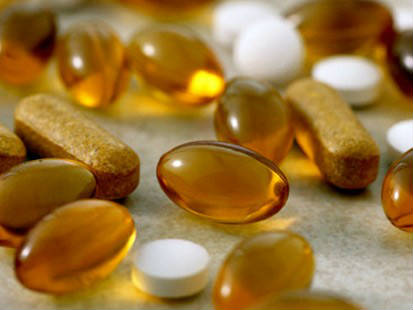
Taking your vitamins has been a staple of the American routine for decades, but its benefits are a chimera.
Contrary to popular opinion, most vitamins provide very little health benefits and are often harmful.
When it comes to choosing a supplement, there’s a critical distinction you need to make:
Synthetic nutrients vs. whole food nutrients.
It makes all the difference in the world.
Why Synthetic Vitamins Are Bad For You
Synthetic vitamins and supplements are made possible by isolating some compound in nature that’s proven to be beneficial, creating a manufacturing process that pumps up its production, and then mass producing it and putting it in bottles.
For most people taking these types of supplements is not useful.
Why?
- Nutrients work synergistically with hundreds of other compounds to create observed health effects
- Many compounds have different forms in nature, and typically only a very few can actually be used by your body.
- The proportion of different nutrients is often just as important the gross amount your body receives
The last point is important to consider. The key principal to modern toxicology is that dosage is everything. And your body is typically very good at making due with very little, and nutritional excesses of a particular nutrient can cause imbalances that are just as egregious as not having enough.
Evidence That Vitamins Are Bad For You
In developed countries there are quite a few longitudional studies that have shown little to no observed health benefit from taking synthetic nutrients.
The most damning study was published in The Lancet in October 2004. It reviewed the existing field of literature linking synthetic vitamins and supplements to incidence rates for cancer, and found that in total, synthetic nutrients slightly increased your chances of developing lifestyle diseases.
And there’s a lot more than that.
Excessive iron has consistently been linked to mitochondrial malfunction, vitamin E to coronary diseases and bone loss, and folic acid to increased cholesterol and heart attacks.
There’s more if you look for it.
The Importance of Nutrient Balance
To understand why excessive nutrients are bad for you, think of your body as a symphony. Every component needs to be just right. Nothing more. Nothing less.
A squawking tuba player is just as damaging to the overall sound of the band as the complete absence of a woodwind section. It works the same way in your body.
For example, take a nutrient like beta-carotene. We all know that beta-carotene is good for us. However, what many people don’t know is that it’s just one of about 600 different compounds that are classified as carotenoids. Your body has receptors and metabolic mechanisms that can be sensitive to all of them. If you flood your body with beta-carotene it overwhelms your cellular receptors and makes them incapable of metabolizing other complimentary nutrients that it needs to put beta-carotene to good use.
This metaphor holds for practically all nutrients within the body.
Diseases of Deficiency vs. Diseases of Excess
Synthetic supplements were a godsend to the human race about 130 years ago. Back then the problem was not getting enough nutrients, and supplements were enough to prevent people from developing conditions that arise from deficiency.
That’s hardly the case now.
Today, the developed world has an opposite problem: overnutrition.
For this dilemma, supplements are not a useful intervention. It’s also why they’re still helpful in developing countries. Iodized salt has probably been responsible for saving millions of lives.
But ask yourself, how many people do you know that suffer from rickets or scurvy? Probably none.
What about cancer, heart disease, high cholesterol and diabetes? Probably a lot.
The latter are all diseases that arise from having too much! Your multi-vitamin won’t help you much there.

A Better Alternative
An article devoted to the dangers of supplements might seem odd coming from a guy who makes a supplement himself.
If I think supplements are bad…..doesn’t that make me a fraud?
No. The key difference is a supplement made from isolated, synthetically derived chemicals and supplements that are derived from whole food sources.
In general I like the motto “plants not pills”, but the truth is it’s impossible to get all the nutrients you need for maximum functioning in your daily diet. Especially when you consider your increased exposure to radiation, pesticides, obesogens, and pathogenic materials in your day to day life. Under those circumstances it’s even more important to get a robust mixture of micronutrients. But you have to get them in their proper form.
For this reason whole foods based supplements are a good idea for many people.
Regular ol’ vitamins? Not so much.
Further Reading:
1). Graat JM. Effect of daily vitamin E and multivitamin-mineral supplementation on acute respiratory tract infections in elderly persons: a randomized controlled trial.
JAMA. 2002 Aug 14;288(6):715-21.
2). Homocysteine Lowering Trailists Collaboration. Dose-dependent effects of folic acid on blood concentrations of homocysteine: a meta-analysis of the randomized trials.
Am J Clin Nutr. 2005 Oct;82(4):806-812.
3). Peto R, Doll R, Buckley JD, Sporn MB. Can dietary beta-carotene materially reduce human cancer rates?Nature. 1981 Mar 19;290(5803):201-8.
4). Omenn GS, Goodman GE, Thornquist MD, Balmes J, Cullen MR, Glass A, Keogh JP, Meyskens FL, Valanis B, Williams JH, Barnhart S, Hammar S. Effects of a combination of beta carotene and vitamin A on lung cancer and cardiovascular disease. N Engl J Med. 1996 May 2;334(18):1150-5.
5). Pietrzik K. Antioxidant vitamins, cancer, and cardiovascular disease. N Engl J Med. 1996 Oct 3;335(14):1065-6;

do you know if this is true if you’re pregnant? my doctor told me that i should take a folic acid supplement.
LikeLike
How exactly do we tell if our multivitamin and supplements are whole foods based or synthetic?
LikeLike
Cindy,
It will say on the label. If you look at the ingredients, a multi-vitamin will say things like riboflavin, methyl-cobalimin, etc. Which are the synthetic compounds used to source the nutrients. Whereas a whole foods supplement will simply list the foods that it contains, like wheatgrass, spirulina, spinach, etc.
LikeLike
If you’d like Cindy, I can write another article specifically about this topic to go into more detail. It can use photos, detailed examples, and list different brands for different types of supplements/vitamins.
LikeLike
That would be very useful! My children and myself are vegans and this information has been the topic of discussion since we’ve recently transitioned to a plant-based diet. Thank you!
LikeLike
Okay, will do.
I will put it into our content calendar for sometime over the next 7-10 days.
LikeLike
[…] == "undefined"){ addthis_share = [];}About two and a half weeks ago on my post about the dangers of synthetic vitamins Cindy asked:How exactly do we tell if our multivitamin and supplements are whole foods based or […]
LikeLike
[…] whole foods than a similar supplement in pill form.Synthetic nutrients should be avoided altogether as I have described in this post.You can also get a whole foods based multi-vitamin, but isolated nutrients are not the nutritional […]
LikeLike
My grandfather and grandmother lived until they were 93 years old and they never took any vitamins or minerals, they ate sometimes fruits and vegetables that’s it. Its all a scam by companies. Why should you stuff your body with something that you do not need.
LikeLike
I find the utility of supplements to be fairly hit or miss. Some do little for your body and are not worth the money. Personally, changes to the environment, growing conditions of the food, and the general stresses of modernity mean intelligent supplementation is a good idea for most people, but I completely agree that there can be excess and waste with certain supplements.
LikeLike
You have a lot of scientific evidence posted there why “synthetic” vitamins are bad. However, you posted zero showing that “whole food” supplements are any better.
I also highly object to the idea that it is “impossible” to cover daily vitamin and phytonutrient requirements with food – our ancestors did exactly that for thousands of years.
LikeLike
Evilcyber, I believe that the reason why it is difficult in this day and age to consume adequate amounts of vitamins and phytonutrients is due to over farming of land, which depletes soil of it’s nutrients. Another prime example of how economic interests compromise human health and the environment…
LikeLike
They did, huh? That’s only conjecture, my friend! We have no real proof one way or the other, and it was too long ago. No doubt they were healthier (though their understanding at that time was vague), I think we could agree on that (needless to say it’s not how it should be!). But whether it is truly impossible… It may well be. We can only acknowledge that, and maybe even assume we can only do the best we are able.
LikeLike
[…] not multivitamins and don’t contain isolated nutrients. I’ve written previously on the problems with synthetic multi-vitamins. However the vitamins and minerals used in the Superfood Plus mix come from whole food sources, […]
LikeLike
[…] synthetic vitamins are being dumped on the market at low prices by the pharmaceutical companies trying to corner the […]
LikeLike
[…] for 60-90 servings.These supplements are a decent buy but I’ve written before about the drawbacks of isolated nutrients. Often the benefits of certain nutrients are derived from their balance with other compounds. For […]
LikeLike
[…] prevent diseases of convenience.The Problems With MultivitaminsI’ve written before about the problems with traditional multivitamins.Two reasons.Low Absorption. Many of the nutrients in a multivitamin are not in a form […]
LikeLike
[…]blog.healthkismet.com??:vitamins.lovetoknow.com […]
LikeLike
[…] I think vitamin E supplements in general are a waste of money. I’ve written before that whole food supplements trump synthetics because of the precise issues surrounding vitamin E supplements. The raw amount consumed has […]
LikeLike
[…] Why Synthetic Supplements Are Terrible And Whole Food Supplements Are Way Better […]
LikeLike
I dont like this article, it’s poorly written and the message is unclear. You say that synthetic vitamins are bad for you , but then you say the’re good in other countries. You’re failing to say that taking vitamins(synthetic) along with food and in proper doses maximizes absorbtion. So they’re not that bad after all, what’s important is the dosage and the timing of ingestion.
LikeLike